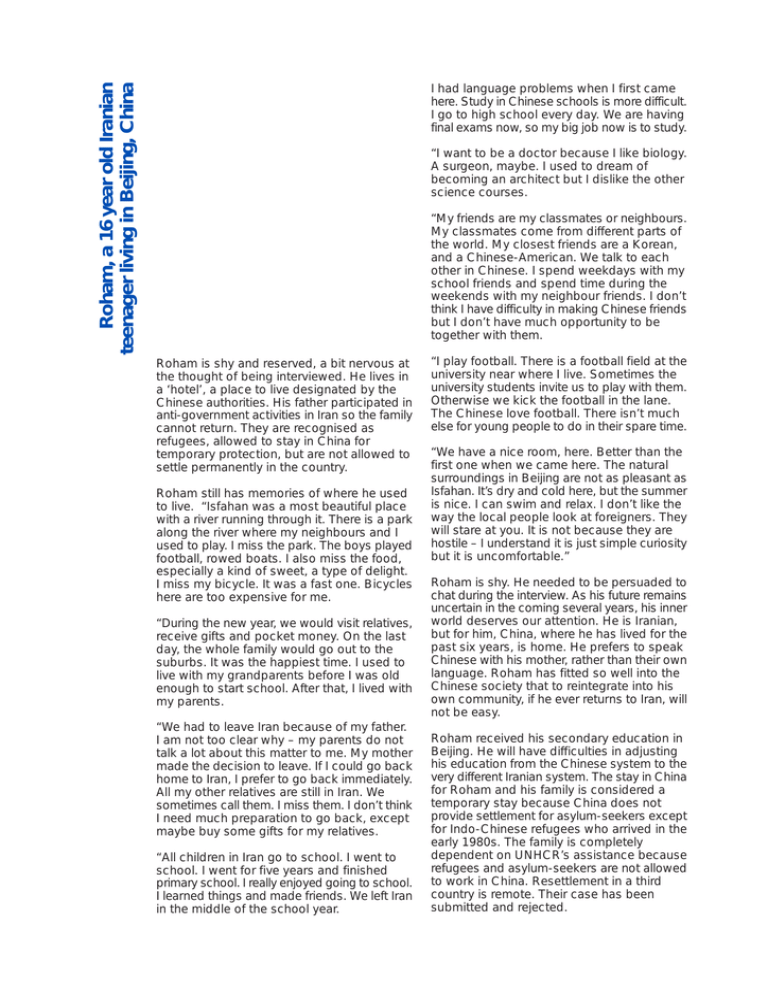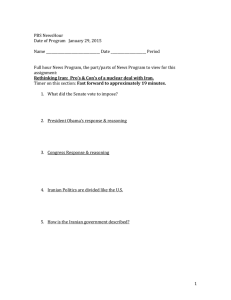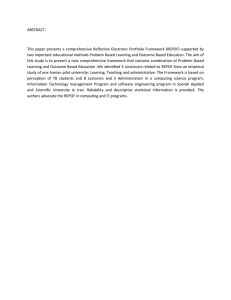Roham, a 16 year old Iranian teenager living in Beijing, China
advertisement

Roham, a 16 year old Iranian teenager living in Beijing, China I had language problems when I first came here. Study in Chinese schools is more difficult. I go to high school every day. We are having final exams now, so my big job now is to study. “I want to be a doctor because I like biology. A surgeon, maybe. I used to dream of becoming an architect but I dislike the other science courses. “My friends are my classmates or neighbours. My classmates come from different parts of the world. My closest friends are a Korean, and a Chinese-American. We talk to each other in Chinese. I spend weekdays with my school friends and spend time during the weekends with my neighbour friends. I don’t think I have difficulty in making Chinese friends but I don’t have much opportunity to be together with them. Roham is shy and reserved, a bit nervous at the thought of being interviewed. He lives in a ‘hotel’, a place to live designated by the Chinese authorities. His father participated in anti-government activities in Iran so the family cannot return. They are recognised as refugees, allowed to stay in China for temporary protection, but are not allowed to settle permanently in the country. Roham still has memories of where he used to live. “Isfahan was a most beautiful place with a river running through it. There is a park along the river where my neighbours and I used to play. I miss the park. The boys played football, rowed boats. I also miss the food, especially a kind of sweet, a type of delight. I miss my bicycle. It was a fast one. Bicycles here are too expensive for me. “During the new year, we would visit relatives, receive gifts and pocket money. On the last day, the whole family would go out to the suburbs. It was the happiest time. I used to live with my grandparents before I was old enough to start school. After that, I lived with my parents. “We had to leave Iran because of my father. I am not too clear why – my parents do not talk a lot about this matter to me. My mother made the decision to leave. If I could go back home to Iran, I prefer to go back immediately. All my other relatives are still in Iran. We sometimes call them. I miss them. I don’t think I need much preparation to go back, except maybe buy some gifts for my relatives. “All children in Iran go to school. I went to school. I went for five years and finished primary school. I really enjoyed going to school. I learned things and made friends. We left Iran in the middle of the school year. “I play football. There is a football field at the university near where I live. Sometimes the university students invite us to play with them. Otherwise we kick the football in the lane. The Chinese love football. There isn’t much else for young people to do in their spare time. “We have a nice room, here. Better than the first one when we came here. The natural surroundings in Beijing are not as pleasant as Isfahan. It’s dry and cold here, but the summer is nice. I can swim and relax. I don’t like the way the local people look at foreigners. They will stare at you. It is not because they are hostile – I understand it is just simple curiosity but it is uncomfortable.” Roham is shy. He needed to be persuaded to chat during the interview. As his future remains uncertain in the coming several years, his inner world deserves our attention. He is Iranian, but for him, China, where he has lived for the past six years, is home. He prefers to speak Chinese with his mother, rather than their own language. Roham has fitted so well into the Chinese society that to reintegrate into his own community, if he ever returns to Iran, will not be easy. Roham received his secondary education in Beijing. He will have difficulties in adjusting his education from the Chinese system to the very different Iranian system. The stay in China for Roham and his family is considered a temporary stay because China does not provide settlement for asylum-seekers except for Indo-Chinese refugees who arrived in the early 1980s. The family is completely dependent on UNHCR’s assistance because refugees and asylum-seekers are not allowed to work in China. Resettlement in a third country is remote. Their case has been submitted and rejected.





